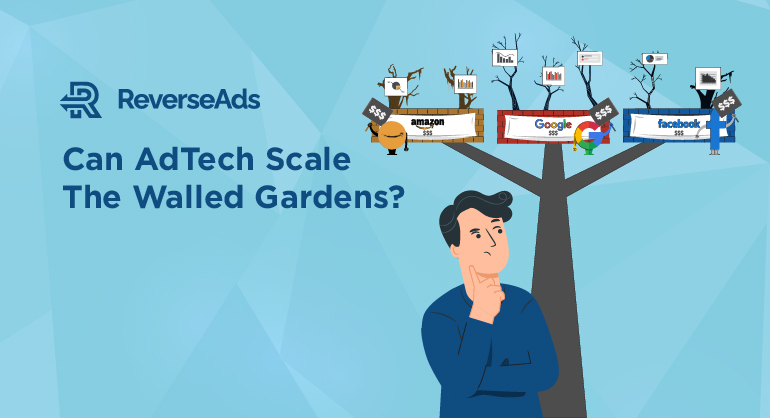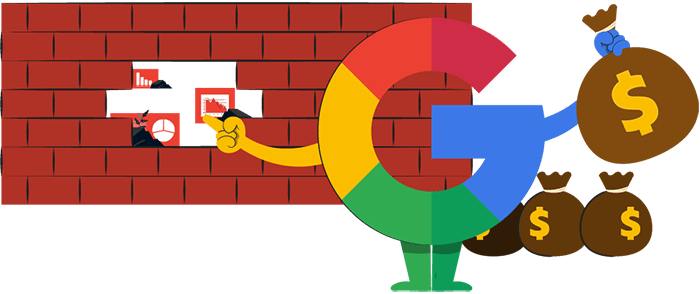Can AdTech Scale The Walled Gardens?

As consumers and business owners, the internet has opened the door to every piece of information that we desire. We have grown accustomed to this access and even taken it for granted. The initial concept of the internet was an expansive network to connect people so that they could freely exchange ideas or information. However, things have changed since the early days of the web, and it has evolved beyond what many ever imagined.
Now, as the internet has matured, this open access is being restricted. While these restrictions are often borne out of a need for enhanced data privacy, tech giants like Facebook and Google exploit their power to maintain exclusive control of this restricted information and sell limited access to the highest bidder. As a result, we have found ourselves in this new era of ‘Walled Garden Advertising’.

What is Walled Garden Advertising?
Everyone reading this is familiar with Google, Facebook, and Amazon. Between these three corporations, they nearly have a monopoly on digital advertising. It is estimated that by the end of 2020 70% of every ad dollar spent will wind up in the pockets of one of these tech giants. The death of programmatic and the phasing out of third-party cookies has helped all three of these companies construct ‘walled gardens’ of data where they can control access.
Digital advertising relies on data, and these tech giants have no shortage of it living within their walls. As third-party data is phased out due to changes in regulations, these walls will get higher and higher, and access comes at a premium. So in essence, as businesses compete for ad space and value for each ad dollar spent, Google, Facebook, and Amazon bathe in their growing reservoirs of user data. They have the power to drive up costs, limit the scope of ad campaigns, all while shrouding data in a veil of secrecy under the guise of user privacy.
Alternative to Our Cookie-less Future
It’s critical to understand why walled gardens are becoming empowered, and it all relates back to advancements in data privacy regulations. Data privacy is essential, especially as more of our personal and professional lives become digitized. This is why governing bodies throughout the world are creating and enforcing strict regulations related to privacy and security.
The slow elimination of third-party cookies sets the groundwork for walled gardens. These platforms are built around logged-in users, which makes it possible to compliantly and securely track usage. These users are first-party users, meaning that third-party cookies are not needed within the platforms they use.
Walled garden platforms cannot share their data with advertisers due to the privacy repercussions. Regardless of this, advertisers still flock to these platforms to run campaigns because of the massive audience spending time there. So the campaigns being executed are lacking pieces of information that would help demonstrate value such as where ads are being served and who is actually viewing the ads but not clicking.

Limited Visibility and Performance Transparency
Businesses running ad campaigns have a specific set of goals in mind, whether that is to increase sales, inspire sign-ups, or boost brand awareness. Savvy business leaders understand that these goals are more easily achieved through insights gleaned through data. As walled gardens grow, these same businesses actually lose ad campaign performance visibility, limiting their understanding of customers and reducing their ability to optimize campaigns and grow sales.
The more time spent on advertising marketing platforms like Google and Facebook, the less performance transparency businesses can access. This is because marketers can’t link walled garden campaign interactions with their own CRM database. Instead of nuanced and individual reporting, companies receive a higher-level summary of performance. Many information gaps exist and a lack of clarity in regard to what worked and what didn’t. Businesses are forced to leave really important decisions in the hands of walled garden companies, who can’t be trusted to do the right thing across every ad campaign.
Without visibility, how can business leaders accurately assess the campaigns that are being run and the ROI of their advertising budgets?
Companies Are Paying More and Getting Less
As the power of walled gardens increases, these companies can boost their prices to advertisers without worrying about losing business to competitors because there are no competitors. This is dangerous because companies like Google and Facebook can operate without caring for their customers’ ROI.
ROI is demonstrably decreasing for most businesses advertising on walled garden platforms, while ad spends continue to rise. COVID-19 has stunted this growth, but digital advertising spending is still growing regardless. 2020 saw a mere 1.7% increase in US ad spend, compared to 19.2% witnessed in 2019 and the 21.1% expected in 2021.
These trends are concerning, which is why many media buyers seek alternative solutions that prioritize ROI and deliver access to buyers everywhere they go online throughout their path to purchase. Despite the amount of money being spent in these walled gardens, a majority of the time that the average internet user spends online is actually outside of the walls. American consumers spend 66% of their time outside of walled gardens and traversing the open web. This fact contradicts the strategy employed by businesses that are spending 70% of their ad budgets within the walled gardens.
Peering Over the Walls
Walled gardens aren’t going anywhere. The rapid growth of these digital ecosystems and the ease with which advertisers can run campaigns within their walls have cemented them within the digital ad space. However, there are still alternative solutions that prioritize campaign performance and ROI, and allow brands to shift resources to where customers are beyond the walled gardens.
Search engine marketing should actually go beyond the search engine. ReverseAds is everywhere after search and our solutions were developed with the cookie-less future in mind. Instead of collecting first-party user data, ReverseAds tracks campaign-level engagement data which protects all users’ privacy as there is no tracking of website histories or match back to individuals. That is why businesses that are overspending within the walled gardens, are looking to make the most of their ad budgets by shifting a percentage of their ad budgets to Google Ads alternatives like ReverseAds.





